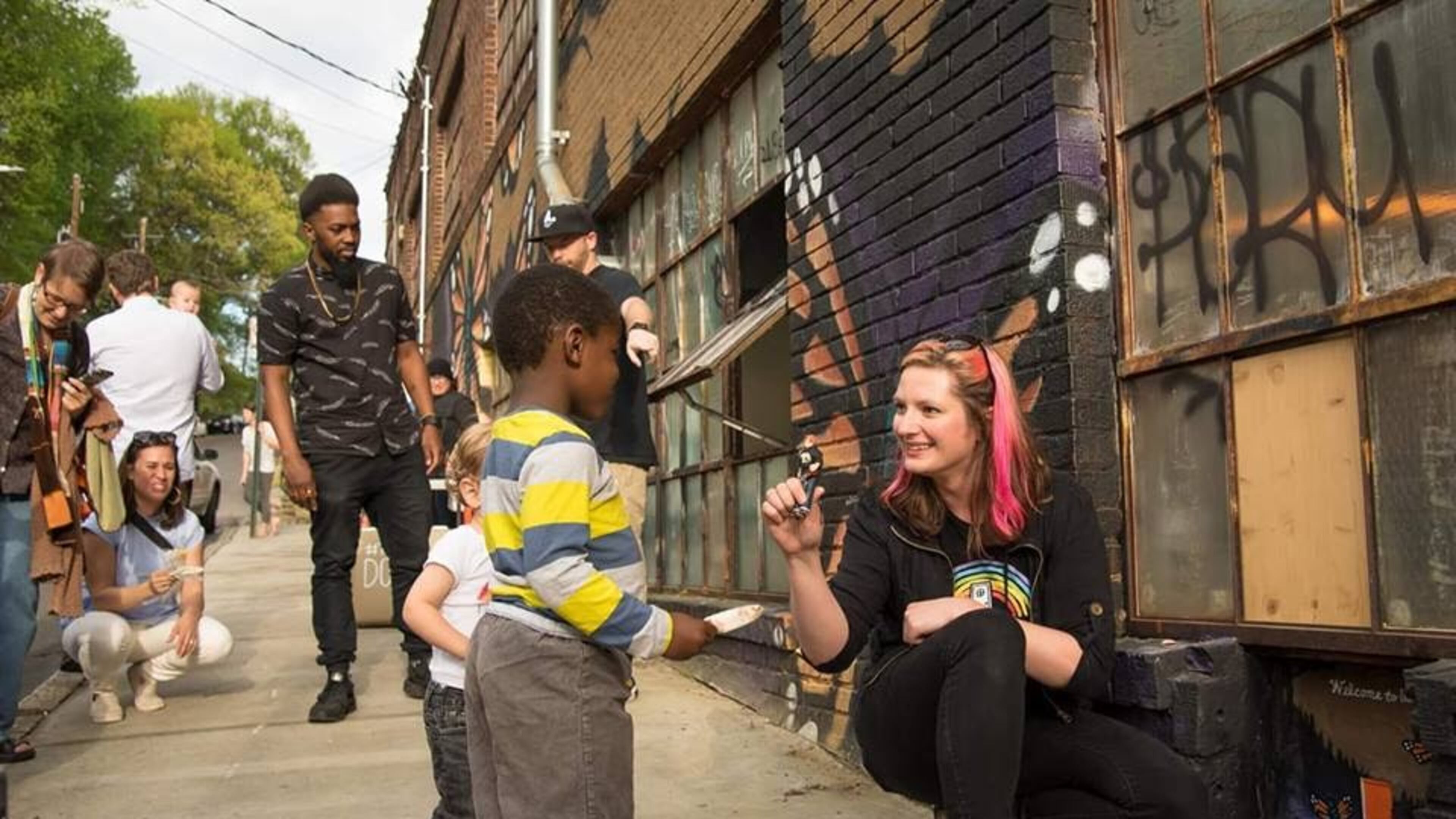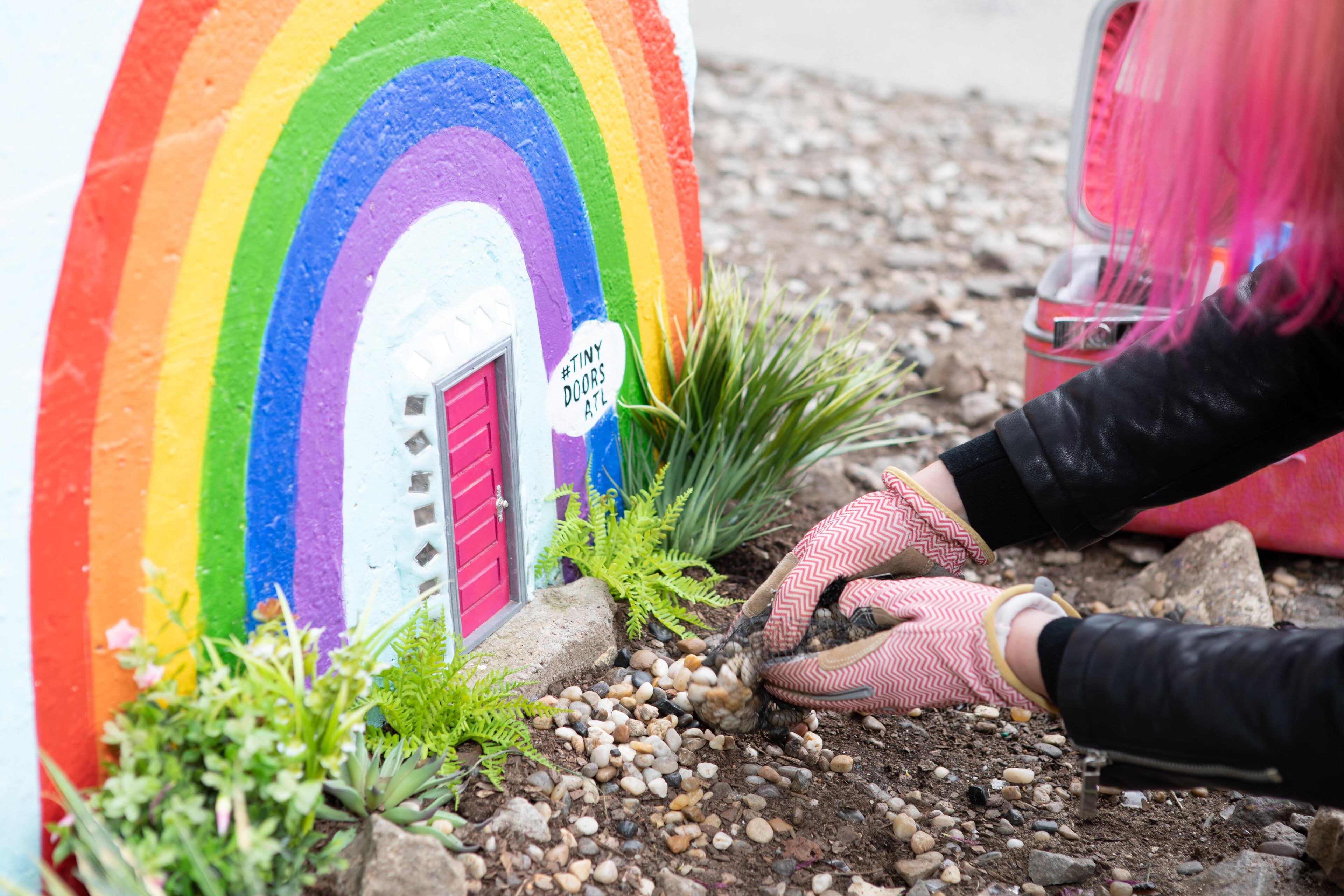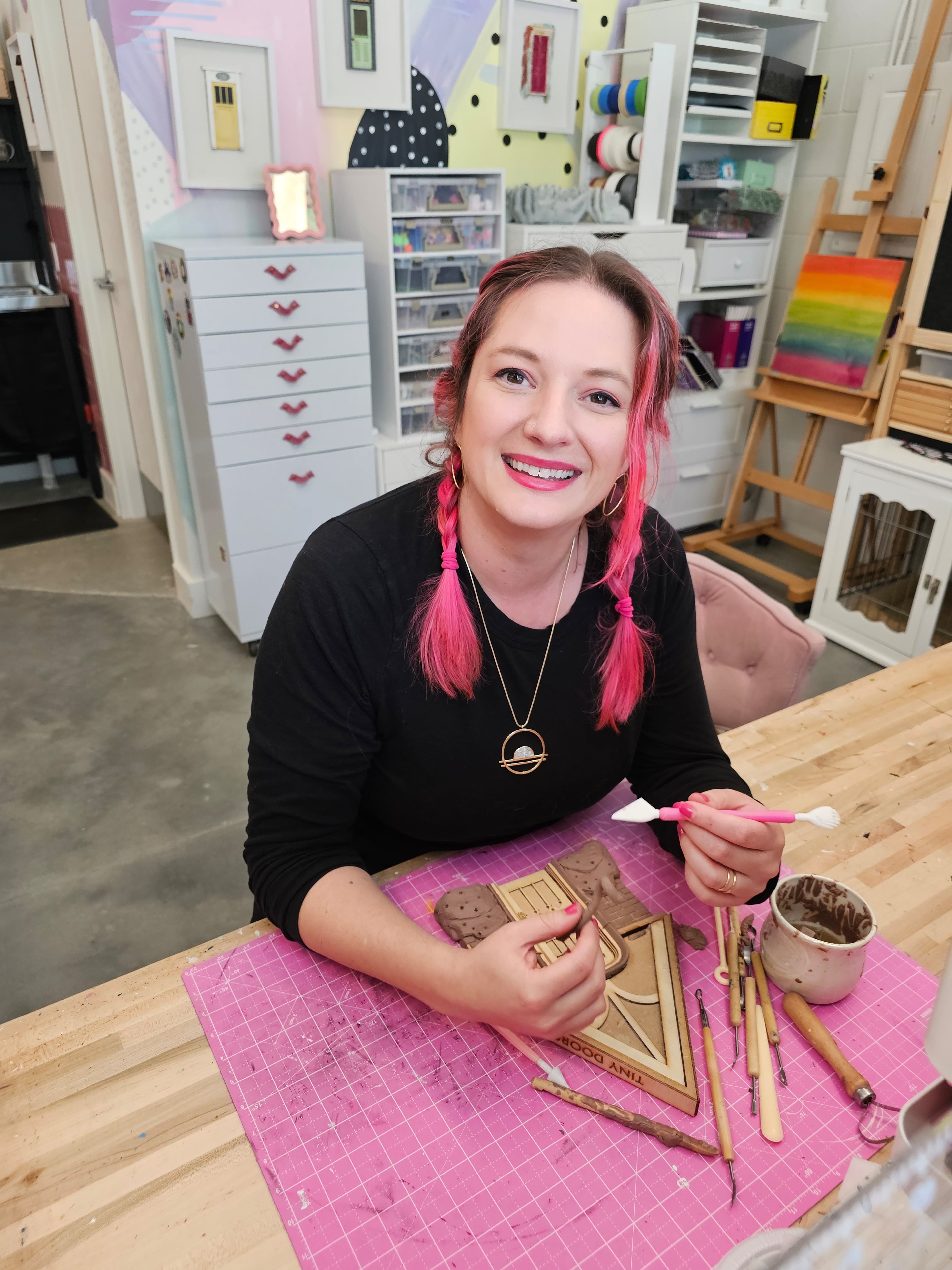Tiny Doors ATL mark 10 years of spreading whimsy across Atlanta

A decade ago, in a humble spot along the colorfully adorned Krog Street tunnel, a tiny gray wooden dollhouse door appeared, low to the ground, hinting at a secret world just beyond its facade. Now known as “Tiny Door 1,” it marks the beginning of creator Karen Anderson Singer’s ever-expanding public art project known as Tiny Doors ATL.
“I love the subversion of the everyday when you play with scale,” said Singer, 41. “It’s such an easy way to get humans outside of their box.”
Now celebrating its 10th year, the Tiny Doors project features 33 installations across the city plus commissions for private companies like Mellow Mushroom, which has seven Tiny Doors across Atlanta, corporate giants Google and Coca-Cola, the Atlanta Hawks, the Georgia Aquarium, Atlanta Botanical Garden and Children’s Healthcare of Atlanta, to name a few. Each one is uniquely designed to fit its locale. For instance, the Jimmy Carter Presidential Library & Museum Tiny Door has golden, peanut-shaped knobs.
Originally from Michigan, Singer came to Atlanta in 2013 after graduating from Rutgers University with a degree in art. Having played bass in a punk band, she volunteered for Girls Rock Camp ATL helping campers learn how to make band logos and screen print T-shirts.

As she got to know the city’s street art scene, the desire to contribute grew.
“I’m not native to Atlanta, so I didn’t want to just impose a project,” she said. “I wanted to add something with a measured amount of respect for the neighborhood. So, I just tried something super small and tried to make it look like it had always been there.”
In July 2014, around dusk, she and a couple friends drove over to the tunnel. Because the ground wasn’t level, she found a hunk of concrete to act as a step, knelt down and affixed a 7-inch tall, gray miniature door to the tunnel wall with cement she had mixed in a plastic cup.
“At the time, there was no small art on the ground. People probably thought I was tying my shoe,” Singer recalled. In a cheeky act of subterfuge, she posted a photo of it to her Instagram account and gave it a hashtag, #tinydoorsatl.
“The first post I made about it was sort of pretending I discovered it,” she said. “Now I look back and I cringe. I’m like, ‘Oh, you silly goose.’”
People noticed — but more than that, they began to interact with the door — leaving little items like small plastic cats or a little doormat. Someone made a tiny copy of The Atlanta Journal-Constitution and deposited it at the doorstep.
After about six months, Singer launched the official Tiny Doors ATL Instagram account, which now, 10 years later, has more than 100,000 followers, including Atlanta Mayor Andre Dickens.
That original Krog Street door, long since retired for a sturdier, weatherproof version, hangs over a door in Singer’s new studio in Reynoldstown, a bright, sparkling space that’s walking distance from the home she shares with her wife, Stacey Singer, and their rescue pup Phoenix, a shy and sweet Husky/Pitbull mix.

The studio brims with the same kind of imaginative, distinctive personality and flourishes that make Singer’s door installations so enthralling. Painted in shades of lavender, blue and pink, the space features a chandelier, rainbow tiles, a garden of “planted” paintbrushes and a wall tagged with multicolored hearts.
The studio is also a bustling hub of hustle. In addition to producing Tiny Doors, Singer makes gift items like ornaments, earrings and necklaces that she sells during the holidays. She has makes miniature sets for a variety of media including commercials, films, theater and a podcast.
In 2022, she self-published a children’s book, “What’s Behind the Tiny Doors?” featuring illustrations by fellow local artist Alex Ferror.
Singer creates her Tiny Doors out of wood and clay and other materials, then she sends them to a mold maker who produces resin replicas. Depending on the size of a project and her timeline, she may bring in other artists to help complete a project.
As she works, she thinks of the audience and how they’ll encounter the art. “I want to surprise people. I want to interrupt their day and make something special happen for them. It is about creating a blank canvas for the imagination and what’s going to get you there without distraction.”
This means often stripping away as many details as possible, keeping only what’s necessary to spark that sense of wonder — trying to predict what kinds of behaviors may arise like an environmental psychologist.
“I sort of classify people’s interactions with Tiny Doors in my head. I think about the people who need to pick at something, they need to move something. So, I’ll add fake plants. ... I think about the people who are going to pull on the knob and knock at the door and how those points are going to wear down.”

Now she sets the different colors into the molded resin so that no matter how much people scratch at a door, the color won’t flake off or fade. She also started installing push doors rather than doors with knobs, which inevitably got torn off. She even creates hollow sound effects.
“There’s a lot with public interaction that I have to work backward from. Most people just take a photo of it, but in doing so, they wear down the ground and there’s erosion, and the seams of the mural start to show. The step gets cracked. Those are the things I’m thinking about. The longevity of the public experience. I’m not trying to control how they react to the world.”
For new installations, Singer generally waits for institutions to contact her. Getting community buy-in is important, “because someone other than me also has to love it.”
When she goes before governmental bodies seeking permission for a new installation, she says, “I want them to see me and go, ‘We can say no to her, and it will be OK.’ … Sometimes they say, ‘That’s historic,” even though it just looks like a rock. It’s a historic rock. You can’t do it there. And I say, ‘OK, I’ll send you an email with a new idea.’ I never want to force my work on anyone. I want it to be a celebration of the neighborhood and Atlanta.”
In collaboration with the Atlanta Beltline, Singer has installed six Tiny Doors along the path, which are highlighted on a colorful map found at tinydoorsatl.com. Each of the doors feature augmented reality that can be activated from the Tiny Doors ATL Instagram account. The website also has a QR code that takes you to a map to all the city’s Tiny Doors.
Singer doesn’t like to play favorites, but some doors stand out in her trajectory as an artist, like the one she installed on the iconic Jackson Street Bridge, which required approval from Atlanta City Council. Shortly after that door was unveiled in May 2023, it showed up in the music video for Usher’s song “Good Good,” featuring 21 Savage and Summer Walker.
“I still can’t believe they let me do it, and I have this panic every time I drive over the bridge, I’m like, is it there?” she said.
To mark the project’s 10th year anniversary, Tiny Doors ATL is partnering with ABV Gallery to host ”Tiny Doors and Friends 2,″ a group show with 80+ artists all collaborating on Tiny Doors pieces. The show begins Oct. 26 at ABV’s new location in East Atlanta Village.
As she approaches the next decade of Tiny Doors, Singer’s influence has exceeded beyond the immediate arts scene in Atlanta and cropped up in classrooms across the Southeast.
Teachers at Atlanta Public Schools and the county school systems of Clayton, DeKalb, Gwinnett, Cobb and Barrow — as well as a school in Spartanburg, South Carolina — have incorporated Singer’s work into a wide range of curricula, from math (especially geometry) to science and history.
“I think a lot of times in the classroom, creativity is kind of overshadowed by worksheets,” said Shannon Green, an art consultant with Arts Now, an organization that works with teachers on leveraging visual arts into core lesson plans. “It helps when you can provide a simple strategy for teachers to let students think critically and come up with ideas and express them. Everybody can look at a piece of Karen’s art and relate to it in some way.”
Of course, there are sometimes discouraging sides of public art, one of which is that it can become a target for hate. One of the oldest and most recognized Tiny Doors is the rainbow door in the Old Fourth Ward. Over the years, that piece has been vandalized multiple times with homophobic slurs, prompting Singer to pour hundreds of hours into restoring it.
Still, Singer takes comfort in the fact that these acts of hate are an anomaly: “If there are half a million people who see the rainbow door, and it gets messed up four times, that’s less than 1%. It’s such a small, small number, it’s almost nobody.”
Atlanta City Council Member Liliana Bakhtiari, who uses pronouns they/them, credits Tiny Doors ATL for shifting the public’s perception of who art is for and where it can be found.
“Art should be accessible to everyone. It doesn’t matter your education, it doesn’t matter your financial background, it doesn’t matter your social status. It’s meant to be the beating heart of a city,” they said. “Organizations like Living Walls and Tiny Doors have shown that art can exist anywhere.”
Now curator of the Indigenous arts of the Americas for the Michael C. Carlos Museum, Miranda Kyle worked with Singer in her previous position as director of arts and culture for the Beltline.
“One of the beautiful things about Karen’s work is she [has] … unlocked this idea that scale is a great equalizer,” said Kyle. “It doesn’t matter if you are 7 1/2 feet tall or you’re in a stroller or you’re in a wheelchair. Anybody can approach that type of scale with wonder.”
More Info
To learn more about Tiny Doors ATL go to tinydoorsatl.com.
Art Preview
“Tiny Doors & Friends.” Free with RSVP. Oct. 26-Nov. 16. ABV Gallery. 1206 Metropolitan Ave., Atlanta. 404-390-3932. abvgallery.com.


